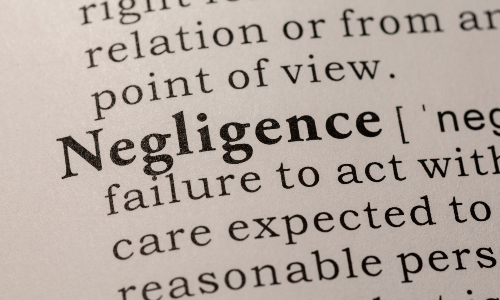What’s the Difference Between Negligence and Gross Negligence Under Massachusetts Law?
Published in Personal Injury on August 11, 2022

Reading Time: 3 minutes
If you have been involved in an accident caused by another party’s actions, you know how important it is to be able to prove negligence in your personal injury claim. When working with your personal injury lawyer to prove that the other party’s negligence led to your losses, you must understand the difference between negligence and gross negligence under Massachusetts law.
If you have been injured in a Massachusetts personal injury accident while driving in the summertime, you may be entitled to compensation from the negligent party. Call 617-391-9001 or fill out our contact form to speak with an experienced personal injury lawyer from Sweeney Merrigan Personal Injury Lawyers.
Negligence vs. Gross Negligence in Massachusetts
A personal injury accident may occur anywhere when least expected, leaving victims with damaging injuries and a long road to recovery. When another person, party, or entity has caused the action that left you injured, they may be found negligent for your losses. However, when filing your personal injury claim, it is vital that you understand the difference between negligence and gross negligence in Massachusetts.
What Is Negligence?
A person, party, or entity who fails to uphold a reasonable duty of care is considered negligent. Massachusetts’ law uses the word “reasonable” to refer to a standard of behavior that the general population would consider good behavior in a dangerous or risky situation. This behavior is different from typical or common behavior. For example, even though many people may speed or text while driving, it does not change the fact that it is not reasonably safe behavior and may lead to a severe accident.
In order to prove negligence in a personal injury claim, you must show evidence of these four elements:
- The at-fault party owed you a duty of care
- They breached the duty of care
- Their actions led directly to your injuries
- You suffered damages as a result
If you are unsure of how you may prove negligence in your personal injury claim, a Massachusetts attorney may be able to help.
What Is Gross Negligence?
When the at-fault party acts so recklessly that they demonstrate a clear disregard for the safety of others, this is gross negligence under Massachusetts law. In order to prove gross negligence, you must prove the four elements of negligence in addition to a fifth element. This element is recklessness or the lack of substantial concern for others.
The definition of gross negligence isn’t clear cut for every type of personal injury accident. To determine whether your accident involved gross negligence, speak with a lawyer who can look into your specific case and answer any other questions you may have.
Our trusted Massachusetts legal team is led by our dedicated co-managing partners, J. Tucker Merrigan and Peter M. Merrigan. J. Tucker Merrigan has been a co-managing partner of the firm for over ten years. He has been recognized for his work helping clients in Massachusetts with honors like being named to the Top 40 Under 40 for National Trial Lawyers; 2018-2021 Rising Star, Super Lawyers, 2020-2021 Lawyer.com Top Attorney Award, and 2023 Best Lawyers in America for Medical Malpractice. Peter M. Merrigan, has been recognized for his work representing clients in the communities of Boston: 2018 Top 40 Under 40, National Trial Lawyers; 2021 Massachusetts “Super Lawyer.”
Can You Receive Punitive Damages After an Accident in Massachusetts?
In most personal injury cases where the at-fault party is found only to be guilty of negligence, the victim may pursue damages for losses like medical expenses, lost wages, lost earning potential, property damage, or pain and suffering. However, in a case where the at-fault party is found guilty of gross negligence, the victim might be eligible to collect punitive damages.
Punitive damages are awarded with the intention of punishing the defendant for causing preventable harm. While punitive damages are not typically awarded in Massachusetts, the law provides an exception for cases of gross negligence that resulted in wrongful death.
Contact a Massachusetts Personal Injury Lawyer Today
At Sweeney Merrigan Personal Injury Attorneys, we have more than 45 years of experience helping clients who have been injured in personal injury accidents as a result of negligence. We have won tens of millions for clients who have been impacted by negligence. Our dedicated legal team fights for the fair compensation you deserve, ensuring your legal rights are protected every step of the way. Our experienced managing partners, J. Tucker Merrigan and Peter M. Merrigan are proud to offer trusted representation. To schedule a free consultation, give us a call at 617-391-9001 or fill out our contact form.
Comments are closed.










